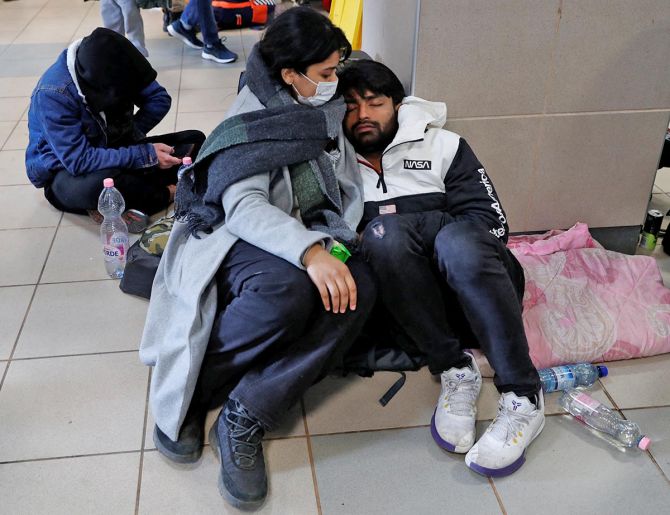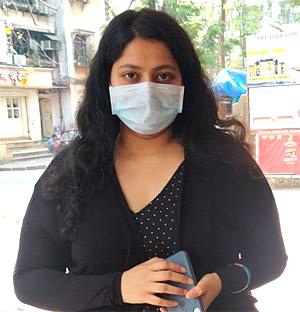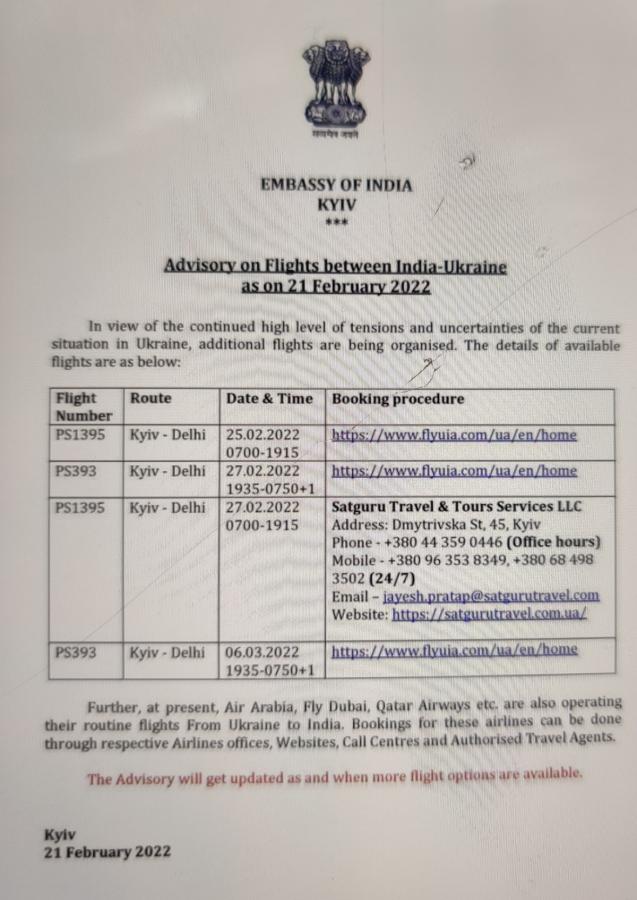'Those (Russian) fighter jets just drop bombs and fly away.'
'How will they know if a bus is carrying Indian students?'

Imagine that you are just 19 or 20 years old.
You are studying in a foreign land because the professional education you want is cheaper there.
Your family has pulled together enough funds to send you away from them, to that country, so that you can fulfill your dream (Do read: Why Indians Study Medicine In Ukraine).
It's something you are aware of, so you are careful with expenses and even with the timings of your trips home.
That country, and a neighbouring former superpower, have been clashing for decades.
Suddenly, the tone of the war drums change and warn of a possible full-scale conflict.
The embassies of the United States and the United Kingdom issue advisories, asking their students to return home.
Your home country's embassy is silent and, when it does finally issue its first advisory, it's so vaguely worded that the decision about whether you should stay or return home is in your hands. And in the hands of your parents.
Meanwhile, as the threat if the coronavirus decreases, the university warns that offline classes are compulsory. If you miss them for more than two weeks, you will be expelled.
What will you do? Will you take a chance and stay? Will you take a chance and return home?
Afsha Khan, a 20-year-old Mumbaikar studying at the Zaporizhzhia State Medical University, decided to leave for India from Ukraine on February 18. It took her three days to get back safely to her home in Mumbai.
As more and more students returned to India, Afsha -- in a conversation that she had with Rediff.com Senior Contributor Neeta Kolhatkar in the early days of March -- reveals what how frightening it has been for the Indian students since February 24, when Russia invaded Ukraine.
- Part I: How I Returned From Ukraine
- Part II: 'Can they understand what they put the students through?'
 IMAGE: Afsha Khan. Photograph: Neeta Kolhatkar
IMAGE: Afsha Khan. Photograph: Neeta KolhatkarDid your university downplay the situation?
It's not just our university.
I have friends in different universities in Ukraine; we all kept in touch as we struggled to keep abreast of the situation.
Like us, they too were told they had to compulsorily attend the offline courses and, if they missed a certain number of classes, they would be expelled.
It was a difficult situation for all the foreign students in Ukraine then. At that point, you didn't know if there was going to be a war or not.
Besides, you had to think about the money your parents were spending to fund your education. You feel the pressure of needing to complete the course on time.
And it was not just the university; half the population there was telling us there would be no war. Even our landlady at the apartment where we were staying said these skirmishes had been going on for eight years and it did not mean there was going to be a war.
At malls, cafes, at almost every place outside the university, people said Russia would not attack Ukraine.
Finally, my family decided I should return home. When I went to hand over my application to the dean, I was told I had to return by February 28 for the offline classes.
There were two reasons why students decided to stay behind -- one was the cost of the airfare. Earlier, we used to pay Rs 30,000-Rs 35,000 at the most and we could carry 40 kg of luggage. By the second half of February, the fares had shot upto Rs 79,000-82,000 and we could carry only 30 kgs of luggage.
The second was the compulsory offline classes and the threat of expulsion if we missed them.
I was very tense; it would have been insane to come home and say I had to go back in two weeks.
It didn't help that we did not get a true picture from the main authorities -- the Indian embassy and our university.
After the second advisory, which was issued on February 17, many of us wanted to leave immediately but could not because they were no flights available.
Even on February 24, when Russia attacked Ukraine, the university refused to say anything.
Earlier, when we -- and the parents -- were asking all these questions on our WhatsApp group, the university officials were very active and would tell us not to panic. After the attack happened, everyone was silent. What we needed at that time was someone to guide us.

Are your friends still stuck in Ukraine (This was before the evacuation process started)?
Yes, some of them are. I am in touch with them whenever possible. They are terrified.
Since they are hiding in bunkers, it is difficult to send messages or make phone calls.
They have run out of food and water. A few seniors step out when they can and try and get water, snacks and biscuits.
The videos and photos my friends have sent is heartwrenching. I am told there are women who are in labour in the bunkers.
COVID protocols -- whether it is sanitisation or social distancing -- do not exist. I understand it is not possible in the current scenario but is scary. If someone falls sick, if something happens to any one of them, they are not going to get any treatment. There are no facilities available.
All the authorities had to do was to tell us to go home; to be cautious and to look out for own safety. We did not ask the university or anybody else to book our flight tickets home; all they needed to do was tell us the truth.
Between the pressure from the university, the non-committal approach of the Indian embassy and statements from our seniors that these kinds of clashes had happened earlier without leading to a war, we were pulled in different directions.
The locals were giving us a different picture, our parents and friends wanted us to leave and we didn't know what was the right thing for us to do.
It is not fair to put this level of responsibility on young students who don't even have a clear picture of what was happening.
Now, the situation is such that, every time there is danger, my friends have to run to the bunkers. If one bunker is full, one has to run five to seven minutes to reach the next one. Also, since all the bunkers are crowded, there is no guarantee that one will get space.
They spend around eight to nine hours in the bunkers.
When they are not in the bunker, they are staying in the hostel but they are struggling for food and water. They can charge their phones till the sirens go off. Once the sirens go off, all power is switched off. It is cold but they are not allowed to use gas because it can blow up if they are bombed and cause more damage.
Is there a good equation amongst all the Indian students for helping each other? What is the situation on the ground level? (This was before evacuation process started.)
It is not hunky-dory from what I hear. Now there are politics within various groups of Indian students.
There are students from Karnataka and Telangana who are being helped by their group leaders.
They are circulating some Google forms that have to be filled so that they can try and evacuate them.
There seems to be no concerted, united, effort by the Indian government to help the other students.
What happens to students from Gujarat, Mumbai and especially north India? All students from India who are stuck there need to be rescued.
Now, the Indian embassy has said they will be evacuated from the borders of Poland, Hungary, and Romania.
The problem is how will the students reach the borders? The roads are blocked with military tanks.
There is no way the students can reach any of these three borders from Zaporizhzhia as each one is quite far away.
One official told the students to leave by bus. From the university, it takes 10 hours to reach Kyiv, just imagine how many more hours it will take them to reach any of these borders.
Also, there is no way a bus can ply safely so now the embassy authorities are saying you drape the bus with the Indian flag. Those (Russian) fighter jets just drop bombs and fly away. How will they know if a bus is carrying Indian students? For them, it is just a bus. How will they see a flag draped on its side?
Besides, the roads are packed with tanks. These are buses, not ambulances, that soldiers will let them go.
It's just getting worse by the day.
The students who have been evacuated by the Indian embassy belong to campuses close to the borders; they are barely 30-40 km away.
There are over 1,700 Indian students in my university who are still stuck there.
In fact, some of the people in the embassy told the students and their parents that they should have left as soon as they received the advisory. Was it so easy for us to leave immediately?
On February 24, around 15 students -- one of my friends was among them -- were booked on a flight that was scheduled to leave on February 24. Within minutes of their reaching Kyiv airport, it was evacuated by the military because an air attack was expected.
Unable to cope with the stress, one of the students fainted!

Feature Presentation: Rajesh Alva/Rediff.com










